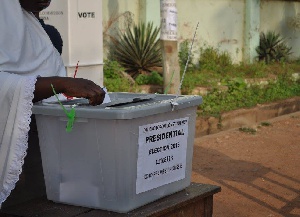 Ghana is set to go to the polls on December 7, 2020
Ghana is set to go to the polls on December 7, 2020
Ghana has conducted successive elections since 1992, giving Ghanaians the right to choose who becomes their President and Member of Parliament in every four years.
In all the successive elections conducted in Ghana, the method used in choosing political leaders has always been the thumb power, where citizens choices are made through ballot casting.
Despite the many successful elections conducted in Ghana, the issue of rejected ballots has been an increasing challenge in each general election. And this makes it difficult to know the true wishes of the electorates in some cases.
In most cases, the percentage of rejected ballots far exceeds the number of votes some political parties get in a general election. Also, these rejected ballots could have been added to the votes of political parties or candidates that lost elections to make them winners.
If rejected ballots were a political party in Ghana, they could boast of a steady increase in performance and popularity ahead of the smaller parties ever since Ghana returned to multiparty democracy.
For example, Ghana has recorded rejected ballots since 1992 as follows: 1992 – 64,354 rejected ballots (3.02%), 1996 – 111,108 rejected ballots (1.53%), 2000 first run; 119,362 rejected ballots (1.8%) and the runoff – 104,214 rejected ballots (1.53%), 2004 – 188,123 rejected ballots (2.13%), 2008 – 205,438 rejected ballots (2.4%) in the first round; 92,886 rejected ballots (1.02%) in the runoff, 2012--251,720 rejected ballots and 2016-168, 882 rejected ballots (1.54%).
In the 2008 general elections for example, if rejected ballots were valid, one of the two major political parties’ contestants (Prof. John Evans Atta Mills of the NDC and Nana Addo Dankwa Akufo-Addo of the NPP) could have won the first round of the elections. This would have saved the country millions of cedis that went into the runoff and also avoid the unnecessary political tensions that came with it.
It is a known fact that within political parties’ internal elections where few of their members in leadership positions vote to elect their leaders, rejected ballots are always recorded. This means that political leaders at the wards, branches, polling stations and electoral areas lack the capacity to conduct voter education within their areas.
In many instances, these rejected ballots are recorded as a result of leaving an ink mark in two or more boxes on a ballot paper for each of the candidates. For example, accidentally touching a ballot paper with an inked finger whiles folding the ballot paper or putting it into the ballot box makes such vote cast invalid. On the other hand, whiles processing a voter for voting, one finger of each of the two hands must carry an ink mark. One, after going through the verification process and second, while thumb-printing in the booth or folding it after casting one’s vote. The ballot paper can be accidentally soiled whiles in the booth to cast the vote. Tension, fear and ignorance most at times also lead to electorates soiling their ballot paper and make their choice invalid.
These rejected ballots disenfranchise all those who cast them. Unfortunately, those who cast such votes mostly did not know that their democratic rights hadn't been recognised. It is very painful to stand in queue for hours in a hot sun to cast one vote in an exercise that provides them with the only chance in four years to have a say in who rules them, only for their votes to be rejected.
Also, who decides which ballot to reject and which not to is a major concern as most of the Electoral Commission temporal staff might either have an interest in who wins or may not be well trained to be true and fair during the counting of ballots. This sometimes brings confusion in some polling stations during counting and provide loopholes for cheating.
Experts are saying that with the two leading political parties placing first and second on the ballot paper, there is a possibility of an increase in rejected ballots in both parliamentary and presidential results.
It is, therefore, necessary that political parties should not only concentrate on selling their messages to the electorates but voter education should be a major activity for all political parties. When citizens know the causes, effects and how to reduce the chances of their votes been rejected, it will reduce rejected ballots in the upcoming December 7th election.
The National Commission for Civic Education (NCCE) need to carry out a vigorous voter education across the country. Local FM Stations should also include voter education into their programs to create awareness on the causes, effects and how to prevent rejected ballots in the coming general elections.
Temporally recruited EC staff must be professional in carrying out their duties. They must be true and fair to all political parties. Political party agents need not to only be vigilant during the sorting and counting of ballots but must be fair in defending which vote should be rejected or not during counting. Security officers deployed to provide security at the polling station must act professional and unbiased manner throughout the voting, counting and declaration of results.
Ghana has done it before. Let us do it again to continue to be the beacon of African democracy with reduced rejected ballots and free, fair and transparent manner.